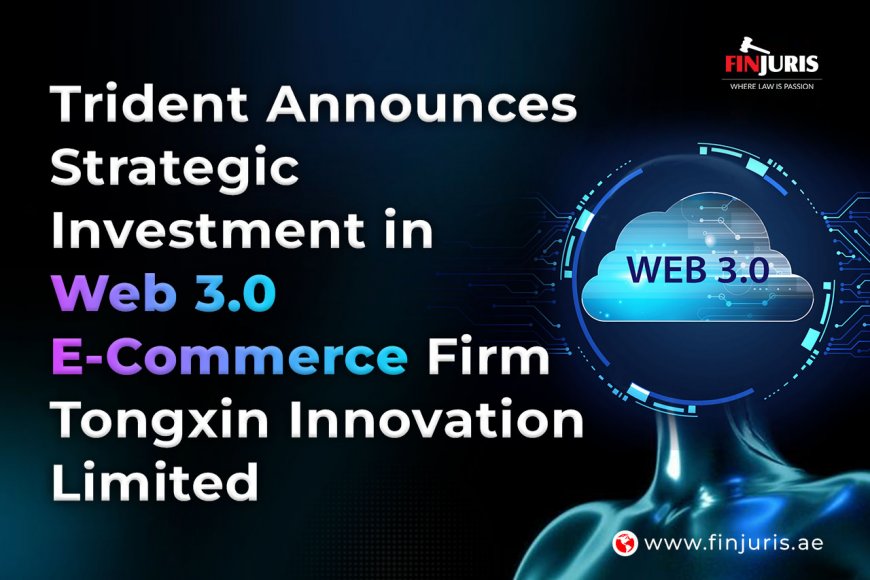Trident Announces Strategic Investment in Web 3.0 E-Commerce Firm Tongxin Innovation Limited
Trident invests $3M for 30% stake in Tongxin, advancing Web 3.0 e-commerce with Telegram-based platform and blockchain integration.

In a historic announcement signalling a commitment to accelerate innovations utilizing blockchain-driven e-commerce solutions, Trident Digital Tech Holdings Ltd (NASDAQ: TDTH), a change agent for organizations in Singapore (anywhere) driving towards digital transformation and blockchain/Web 3.0 activation, confirmed on August 18, 2025, that it has signed a definitive sales and purchase agreement to acquire a 30% equity interest in Tongxin Innovation Limited (Tongxin).
The investment value for Tongxin is roughly US $ 10 million, and Trident’s Gor investment will be approximately US $ 3 million based on the issuance of Trident’s American Depositary Shares (ADSs), Class B ordinary shares, payment to the existing Tongxin shareholders.
Read More: Crypto Consulting Services: Navigating the Future of Digital Finance
The Growth of Web 3.0 E-Commerce
Transitioning from Web 2.0 to Web 3.0: What is different?
Web 2.0 e-commerce platforms, like Amazon, eBay and Alibaba rely upon significant centralized databases, payment capabilities, and digital advertising. While these infrastructures are scalable, they grapple with the issues of:
- Inescapable transaction costs via intermediaries.
- Data privacy issues regarding who owns customer data.
- Little financial inclusion to those who remain external to mainstream banking and finance.
Now, through the use of blockchain, smart contracts, and digital identities, the oncoming web 3.0 e-commerce provides an opportunity for verifiability within one transparent supply chain, token-based loyalty rewards programs, and a digitally enhanced user experience, resulting in an ecosystem where consumers and merchants have more agency.
Dubai, Singapore, and Hong Kong are leading the charge towards this Web 3.0 future, with forward-thinking regulation, smart city developments, and investment into new blockchain incubators.
Read More: Web3 Compliance in the UAE: Role of Digital Asset Lawyers in Dubai
Tongxin's ToMe Platform: A Disruptor in Telegram-Native E-Commerce
Tongxin envisions ToMe as a Web 3.0 e-commerce super app that leverages Telegram. Unlike other e-commerce platforms, ToMe is offering value where consumers already spend their time: in messaging ecosystems.
The 4F Value Proposition
- Fair: Digital rights respected through blockchain verification.
- Fast: Stablecoin payment features enable cross-border payments in near real-time settlement.
- Friendly: The familiar community aspect of Telegram allows buyers and sellers to develop as active participants.
- Free: ToMe advocates for open, permissionless commercial transactions with minimal reliance on centralized gatekeepers.
With only TikTok estimated to have higher user penetration compared to the 1 billion Telegram users worldwide, it is clear ToMe is leveraging the unique platforms.
Going Beyond Digital
Tongxin is already in talks working with AI-driven, real-world asset (RWA) shopping mall operators based in Southeast Asia - creating a "phygital" (physical and digital) shopping experience. Customers may be able to scan a product in a mall, confirm on-chain authenticity, and pay using a stablecoin wallet through Telegram.
TON Ecosystem: Why It Matters
The Open Network (TON) was originally developed by Telegram as a blockchain ecosystem for the masses. TON is well-positioned to include consumer-facing applications because it can scale, low transaction cost per community engagement, and can embed into Telegram.
Tongxin's ToMe platform is at the intersection of Wheels: the capabilities of TON and Web 3.0 commerce. ToMe using TON can:
- Automatically scale transactions to millions per second with no network congestion.
- Use micro-payments, loyalty points and rewards in a frictionless manner.
- Access decentralized finance (DeFi) tools for merchants.
This synergy allows ToMe to be not just an e-commerce platform but rather a Web 3.0 lifestyle platform.
Read More: Tokenized Property in Dubai Explained: Benefits, Laws & Investment Tips
Strategic Alliances: Tridentity Meets ToMe
Trident's primary blockchain identity application, Tridentity, enables safe, user-controlled authentication. Combining Tridentity's single sign-on and ToMe's commerce infrastructure, both companies expect:
- Frictionless onboarding via blockchain identity.
- Enhanced trust-enabled transactions where both buyer and seller are known.
- Reduced fraud and counterfeiting, particularly in the luxury goods and digital assets space.
With Tridentity and ToMe's collaboration, ToMe may be the first commercial e-commerce platform to incorporate blockchain ID, a major differentiating factor in markets where a lack of trust is a barrier to adoption.
Read More: VARA and Crypto: The Function of VARA in Protecting Investors in the Crypto Market
Leadership Vision
Soon Huat Lim, Founder, Chairman and CEO of Trident, commented that Tongxin's ToMe is "e-commerce of the future," in that it will tap into mass consumer traction through existing platforms, like Telegram, while at the same time managing and engaging traffic within a Web 3.0 infrastructure. He stressed the "phenomenal synergies" between Tridentity and ToMe, stating that the ability to partner with Tongxin/Tome will be a large part of Trident's global Web 3.0 enablement strategy.
Tongxin's leadership have done business at eBay, PayPal, Tencent and JD.com, and have been successful in scaling payments ecosystems and online marketplaces. This combination of experience in Web 2.0, and innovation and vision for Web 3.0 - could be the combination that defines their market in terms of consumer adoption at scale.
Implications for the E-Commerce Sector
For Consumers
- Speedier cross-border payments without bank or third-party delays.
- Ownership of your identity and your transaction history.
- Community-driven loyalty rewards and token rewards.
For Merchants
- Lower platform fees than centralized players.
- Access to Telegram’s audience of about 700 million people.
- Integration of blockchain-based tracking in the supply chain.
For Regulators
- An experiment in how Web 3.0 commerce could be safely integrated into our economy.
- A glimpse into consumer protection, anti-money laundering (AML), and stablecoin-regulation.
Competition
Tongxin’s ToMe competes with:
- Binance Pay: crypto-based merchant payments.
- Shopify blockchain pilots: NFTs and tokenized loyalty.
- Super apps like Grab and Gojek: digital wallets and commerce.
However, ToMe’s emphasis on a deployment environment focused on Telegram may allow it to benefit from the steep uptake driven by network effects.
Read More: Crypto License in Dubai: Everything You Need to Know in 2025
Future Outlook
Short-Term (2025–2026)
Over the next two years, Trident and Tongxin are expected to prioritize integration, partnerships, and proof of concept rollouts that will establish ToMe as a credible Web 3.0 e-commerce contender.
- Integration of Tridentity Authentication into ToMe
The first step will be embedding Trident’s blockchain-based identity solution, Tridentity, directly into ToMe’s e-commerce architecture. This will give ToMe the unique edge of secure, decentralized user authentication, reducing fraud and enabling seamless one-click onboarding. Users will benefit from being able to verify their identity across multiple platforms with a single decentralized ID, while merchants gain trust and lower disputes. - Expansion into Dubai, Singapore, and Hong Kong with TON Partnerships
These three regions have positioned themselves as Web 3.0 innovation hubs, with Dubai hosting blockchain regulatory sandboxes, Singapore championing fintech adoption, and Hong Kong aggressively licensing digital asset companies. By forging deep partnerships within the TON ecosystem in these geographies, ToMe will likely establish itself as the default Web 3.0 shopping gateway for millions of users in Asia and the Middle East. - Pilot Programs with AI-Powered Shopping Malls in Southeast Asia
Early pilot projects will test how ToMe integrates with physical retail outlets. Imagine walking into a shopping mall in Bangkok or Kuala Lumpur, scanning a product, and immediately verifying authenticity on-chain while paying in stablecoins. These AI-driven RWA shopping malls could serve as testbeds for phygital commerce, where blockchain bridges the gap between online platforms and brick-and-mortar retail.
Mid-Term (2027–2028)
As the platform matures, the mid-term focus will shift toward scaling adoption, launching new revenue streams, and entering underserved markets.
- Launch of Tokenized Loyalty Programs on ToMe
Tokenized loyalty systems will allow merchants to issue blockchain-based reward tokens that can be traded, redeemed across multiple stores, or even staked for value. This creates a cross-merchant loyalty ecosystem, a major leap from the siloed loyalty programs of Web 2.0. Customers benefit from more flexible rewards, while merchants gain higher retention rates and marketing opportunities. - Growth of RWA Commerce: Blending Physical and Digital Shopping
Real-world assets (RWA) tokenization is set to be a defining Web 3.0 trend. ToMe could become a central hub for tokenized goods, from luxury handbags to real estate. Consumers might buy a digital certificate of authenticity for a handbag stored in Dubai, trade it online, and redeem it in person when desired. This seamless merging of physical and digital ownership could disrupt both retail and supply chain models. - Strategic Expansion into Africa
With Trident already active in Africa through identity projects, this region represents a huge growth opportunity. Africa’s young, mobile-first population and rising adoption of mobile money services (like M-Pesa) create fertile ground for blockchain-powered e-commerce. ToMe could become a gateway for cross-border trade, empowering small businesses to sell internationally without depending on traditional banking systems.
Long-Term (2029 and Beyond)
Looking further ahead, Trident and Tongxin’s ambitions extend far beyond regional rollouts, they aim to redefine global commerce in the Web 3.0 era.
- Positioning ToMe as a Global Web 3.0 Commerce Super App
By the end of the decade, ToMe could evolve into a super app that goes beyond e-commerce, integrating payments, identity, community engagement, tokenized loyalty, and AI-driven shopping assistance. Like WeChat did for messaging and payments in China, ToMe could become a one-stop platform for digital trade, but with the added benefits of decentralization and blockchain security. - Potential IPO of Tongxin as an Independent Entity
If ToMe achieves critical scale, Tongxin Innovation Limited may seek an initial public offering (IPO), either in Hong Kong, Singapore, or even NASDAQ. This would unlock new funding for further expansion, give early investors liquidity, and cement Tongxin’s position as a Web 3.0 market leader. - Evolution of Trident into a Web 3.0 Conglomerate
With strategic stakes in digital identity, blockchain payments, and now e-commerce, Trident is positioning itself as a multi-sector Web 3.0 powerhouse. By 2030 and beyond, Trident could oversee a portfolio of Web 3.0 ventures ranging from decentralized finance (DeFi) to tokenized supply chains. The company’s vision would no longer be limited to identity, it could span the entire spectrum of digital trade, cementing its role as a global enabler of decentralized economies.
Trident's US $3 million investment into Tongxin Innovation Limited for a 30% share is not just a financial transaction but a strategic bet on the future of e-commerce. Blending Tridentity's blockchain identity platform with ToMe's Telegram-native e-commerce platform gives the two companies a way to build a secure, decentralized, and global digital trade environment.
As Dubai, Singapore and Hong Kong drive the adoption of Web 3.0, this partnership could also become a model for how to incorporate blockchain technology into commerce worldwide. The road ahead will be risky, but if Trident and Tongxin succeed they could position themselves as leaders in creating an entirely new way to buy, sell, and engage online in the era of Web 3.0.
What's Your Reaction?




















